If opening a coffee shop in Singapore requires passion and craftsmanship, then launching a construction company demands credentials, capital, and a bit of “strategic thinking.”
Don’t worry—I’m not discouraging you. Instead, I’m sharing an industry insider tip: With the right conditions, you can obtain your construction company license within a month, transforming from a “paper company” into a “qualified contractor ready to take on projects.”
That said, launching a construction firm isn’t as simple as “opening a Taobao store.” There are several “mandatory procedures” and “common pitfalls” to navigate. Today we’ll break it down step by step, helping you avoid pitfalls when starting a construction business in Singapore.

I. Why Start a Construction Company in Singapore?
Truth be told, Singapore’s construction industry is anything but “niche.”
1. Singapore builds HDB flats annually, upgrades MRT lines, and drives urban renewal.
2. Commercial real estate projects keep emerging—landmark developments like Changi Airport and Marina Bay showcase builders’ achievements.
3. According to BCA and Lianhe Zaobao data, construction demand is projected to reach S$25-32 billion by 2025.
In other words: Plenty of work, stable income, clear rules.
Moreover, one of the most reassuring aspects of doing business in Singapore is the transparency of processes—no backroom deals. As long as you meet the requirements, you can apply for a license.
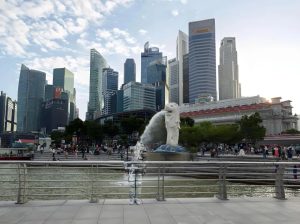
Source: Lianhe Zaobao

II. First, Decide on Your Company Structure:
Register Your Company with ACRA (BizFile+)
The first step is to register your company (via ACRA’s BizFile+ platform).
1. Required documents for company registration:
Company name, Articles of Association (ACRA template available), director and shareholder details, authorized capital (may specify paid-up/paid-in capital), and registered business address.
Upon completion, you will receive the company’s UEN (Unique Entity Number). This serves as the foundational credential for all subsequent procedures: applying for a Builder’s Licence with BCA, searching for required licenses on GoBusiness, and verifying company existence with banks.
For detailed company registration procedures, refer to ACRA’s “Setting Up a Local Company”.
2. Tips
If you have a seasoned construction professional (to serve as AP/TC) with years of experience, prepare their documents in advance (ID card, educational certificates, work experience proof). This significantly reduces back-and-forth during the subsequent BCA application process.
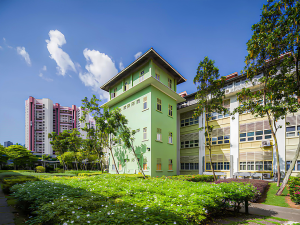
Source: Lianhe Zaobao

II. Key Personnel Appointments: AP and TC
BCA’s Builders Licensing requires companies to appoint an Approved Person (AP) and a Technical Controller (TC).
Both roles may be filled by the same individual (preferably a company director), but note the following:
1. Appointment of AP and TC
The appointment, qualifications, and declarations for both AP and TC must be uploaded via the eBACS system (BCA’s Builders Licensing / eBACS platform).
One individual may serve as AP for multiple companies, but can only be TC for one company. This is a frequently overlooked restriction. If you have only one “technical expert,” ensure they are not concurrently designated as TC for multiple companies.
2. Minimum Qualifications for AP/TC (Class 2, Official Requirements)
AP: Diploma in construction-related field, or Bachelor’s/Master’s degree in any discipline, plus at least 3 years (cumulative) of construction project execution experience (Singapore or overseas).
TC: Same as above, requiring relevant academic qualifications and at least 3 years (total) of project experience.
These qualifications are verified through BCA forms and declaration documents.
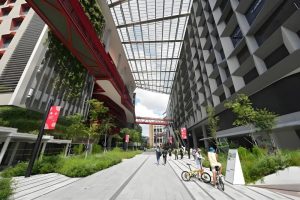
Source: Lianhe Zaobao

III. Capital Threshold:
Don’t skimp on paid-up capital
When applying for a Class 2 General Contractor license, corporate entities must meet minimum paid-up capital requirements:
Class 2 (General Builder / Specialist): Minimum S$25,000.
Class 1 (for future larger projects): Minimum S$300,000.
Additionally, applicants must submit bank statements or proof of paid-up capital to demonstrate financial standing. BCA’s Builders Licensing Guide and FAQ explicitly list these minimum capital requirements and fees (Class 2 application fee: S$1,200).
Practical Advice: Setting paid-up capital above the minimum threshold (e.g., S$5,000–20,000 higher) is advisable. Bank statements and audited financial statements (if available) can also strengthen your application, reducing the risk of BCA requesting additional documentation.
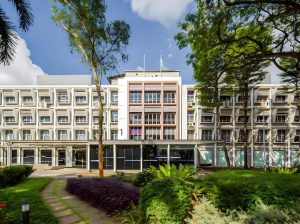
Source: Lianhe Zaobao

IV. Online Application via eBACS
Builder’s Licence (Process & Checklist)
BCA requires all Builder’s Licence (and Contractors Registration / CRS) applications to be submitted through its eBACS platform. The process is as follows:
1. Register a company account on eBACS (log in as the company).
2. Under the “Builders Licensing” option, select to apply for Class 2 (or Class 1 / Specialist).
3. Upload documents: Company registration certificate (ACRA), ID cards of AP and TC, academic certificates, proof of work experience, BCA’s AP/TC declaration form (signed), company bank statements or proof of paid-up capital, and other supporting documents required by BCA.
4. Pay the license application fee (Class 2: S$1,200).
5. Await review. With complete documentation, BCA states “processing typically takes about 2 weeks under normal circumstances.” (Incomplete submissions will require additional documentation, extending processing time).
One-Minute Pre-Submission Checklist: ACRA company certificate, AP/TC education/experience proof, AP/TC BCA declaration, company bank statement (showing paid-up capital), articles of association (if required), payment screenshot or receipt.
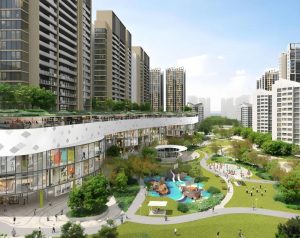
Source: Lianhe Zaobao

V. Additional Pre-Business Compliance:
HDB/URA/MOM/GoBusiness
Obtaining a BCA license is merely an “entry ticket.” Different job types or projects may require additional registrations or permits from other government agencies:
1. HDB (Public Housing)
If you plan to undertake interior renovations or HDB-related projects, note HDB’s DRC (Directory of Renovation Contractors) list and renovation requirements; Certain projects only accept contractors listed in the DRC.
Always review HDB’s renovation and contracting requirements first.
2. URA/CORENET X
Large-scale construction and land use planning require integration with systems like URA/CORENET (e.g., construction permits, plan submissions). BCA and URA have been advancing collaboration on systems like CORENET X in recent years.
3. MOM/Foreign Worker Employment
If your company will hire S Pass/WP holders, note that since 2025, BCA’s CRS (Contractors Registration System) has been more closely integrated with MOM’s foreign worker application processes (e.g., in certain cases, companies must first register in CRS before submitting work pass applications). Additionally, comply with construction industry foreign worker quotas and levy rules.
Ensure you review MOM’s construction sector work pass policies and quota requirements before recruitment.
4. GoBusiness
When establishing a company or applying for licenses, GoBusiness’s License e-Adviser can provide a comprehensive list of required licenses or supplementary documents in one go. It is recommended to first check “What Licenses Do You Need?” on GoBusiness.
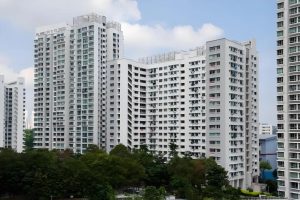
Image Source: Lianhe Zaobao

VI. Time and Cost Budget (Practical Edition)
Combining the above processes, here is a realistic timeline and cost estimate (using Class 2 as an example):
1. General Process
ACRA Company Registration: Typically completed within 1–2 days (if documents are complete).
Internal Document Preparation (AP/TC certificates, academic qualifications, experience proof, bank statements): 1–7 days (depending on document completeness).
eBACS Application Submission + Payment (Class 2 Fee: S$1,200): Single operation, can be completed within 1 day.
BCA Processing Time: Approximately 2 weeks (with complete documentation). Additional time required if BCA requests supplementary documents.
2. Overall Budget (Minimum Estimate)
ACRA Company Registration Fee (varies based on share capital structure, etc.) + Banking Service Fees;
BCA Class 2 Application Fee: S$1,200;
Recommended paid-up capital: S$25,000 (official minimum), but allocate additional operational funds (e.g., S$30K–50K) for bidding, guarantees, or temporary liquidity.

Source: HDB

VII. Common Pitfalls and Avoidance Guide:
Particularly critical for foreign partner/foreign worker companies
Do not assign TC to individuals already serving as TC for another company: Regulations permit only one TC per company at any given time. Misassignment will result in application rejection.
Prepare “verifiable” AP/TC experience documentation: Include employment verification, project timelines, and recommendation/certification letters from prior employers—the more detailed, the better.
If your company plans to undertake HDB/public sector projects, verify DRC and CRS requirements in advance. Register with CRS beforehand if necessary.
Before hiring foreign workers, check MOM quotas and CRS binding rules to avoid being unable to apply for WP/S Passes due to lack of CRS numbers.
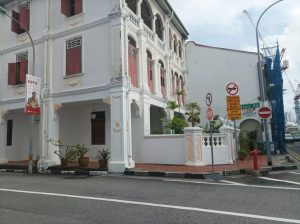
Image: Singapore residential area
Conclusion: Speed is important, but don’t treat regulations as “soft suggestions.”
Establishing a construction company in Singapore and obtaining a Class 2 license within a short timeframe is indeed feasible: an experienced Authorized Person (AP)/Technical Consultant (TC), complete documentation, sufficient paid-up capital, and a one-time submission via eBACS can reduce the process to a few weeks to a month.
However, the key is to prepare documents “exactly as officially required” to avoid minor details delaying the entire process. Official platforms (ACRA, BCA eBACS, GoBusiness, MOM, HDB, etc.) provide clear forms and checklists. Following these instructions yields a high success rate.
Note: Reference materials sourced from Singapore’s ACRA, BCA, GoBusiness, MOM, HDB, URA, Lianhe Zaobao, and compiled from comprehensive news reports. Reproduction requires attribution; contact for removal if infringing….
